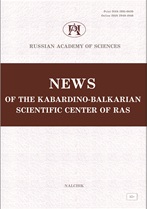|
This article is cited in 1 scientific paper (total in 1 paper)
Information Technologies and Telecommunications
Ontoepisociophylogenetic development
of artificial general intelligence systems
based on multi-agent neurocognitive architectures
M. I. Anchekova, K. Ch. Bzhikhatlova, Z. V. Nagoeva, O. V. Nagoevab, I. A. Pshenokovaa
a Kabardino-Balkarian Scientific Center of the Russian Academy of Sciences,
360010, Russia, Nalchik, 2 Balkarov street
b Institute of Computer Science and Problems of Regional Management –
branch of Kabardino-Balkarian Scientific Center of the Russian Academy of Sciences,
360000, Russia, Nalchik, 37-a I. Armand street
Abstract:
The purpose of the study is to study the possibilities of multi-generational optimization of
control systems based on multi-agent neurocognitive architectures to create general artificial intelligence
agents capable of independently solving a universal range of tasks in a real environment. The main
principles for achieving the adaptive stability of general artificial intelligence agents based on multi-agent
neurocognitive architectures to the operating conditions based on ontophylogenetic learning in the process
of synthesis of problem solving over dynamic decision trees are developed. The basic principles for
constructing algorithms for multi-generational optimization of the structural and functional organization
of general artificial intelligence agents based on multi-agent neurocognitive architectures, taking into
account genetic, ontological and social factors, have been developed.
Keywords:
general artificial intelligence, multi-agent systems, genetic algorithms, cognitive architectures,
ontophylogenetic learning, artificial neurons.
Received: 01.12.2022
Revised: 07.12.2022
Accepted: 14.12.2022
Citation:
M. I. Anchekov, K. Ch. Bzhikhatlov, Z. V. Nagoev, O. V. Nagoeva, I. A. Pshenokova, “Ontoepisociophylogenetic development
of artificial general intelligence systems
based on multi-agent neurocognitive architectures”, News of the Kabardino-Balkarian Scientific Center of the Russian Academy of Sciences, 2022, no. 6, 61–75
Linking options:
https://www.mathnet.ru/eng/izkab514 https://www.mathnet.ru/eng/izkab/y2022/i6/p61
|


| Statistics & downloads: |
| Abstract page: | 60 | | Full-text PDF : | 16 | | References: | 18 |
|



 Contact us:
Contact us: Terms of Use
Terms of Use
 Registration to the website
Registration to the website Logotypes
Logotypes